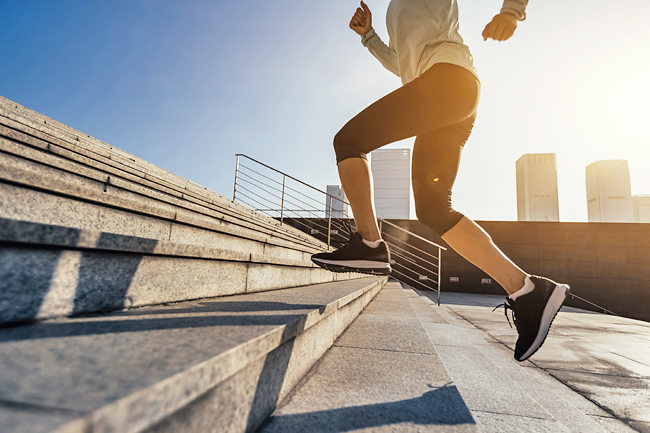Gretchen Reynolds
THE WASHINGTON POST – Here’s an easy and effective way to add physical activity to your daily routine during the new year: turn your exercise into a snack.
New research shows exercise “snacks”, which consist of brief spurts of exertion spread throughout the day, can improve metabolic health, raise endurance and stave off some of the undesirable changes in our muscles that otherwise occur when we sit too long.
“It’s a very practical approach” to physical activity, said Associate Professor of Muscle Physiology at the University of Toronto in Canada Daniel Moore, who led a 2022 study of exercise snacking and muscle health.
The physiological benefits of activity snacks can rival those of much longer sessions of brisk walking or other, traditional workouts, the science shows. And they come in multiple flavours, from stair climbing to unobtrusive chair squats in your office. Such “snacks” require no gym membership, special shoes or other equipment; office attire is optional but okay, and the time commitment is minimal.
But to get the most from exercise snacking, it helps to understand where, when and why you should fit in snacktivity breaks.


SNACK ON THE STAIRS
By definition, an exercise snack is a brief snippet of exercise, usually lasting a minute or two and indulged in often during the day. It represents “a feasible, well-tolerated, and time-efficient approach” to working out, according to a 2022 review of exercise snacking research.
Small in portion size, exercise snacks, cumulatively, can be quite potent.
In a telling 2019 study, healthy college students snacked on exercise by rapidly climbing and descending three flights of steps, three times a day – in the morning, at lunchtime and again in late afternoon – almost every day for six weeks.
They did not otherwise work out. But after six weeks, they had gained significant amounts of aerobic fitness and leg strength.
Similarly, when some of the same exercise researchers asked people either to ride stationary bicycles in the lab for a single, 10-minute session of intense interval training or pop into the lab every few hours and pedal hard for about a minute’s worth of intervals, the groups’ gains in fitness were nearly comparable after six weeks.
Snacking on exercise had been as effective as a longer and more-traditional workout.
EXERCISE SNACKING CAN SOLVE YOUR SITTING PROBLEM
Exercise snacks may be uniquely effective at counteracting the ills of over-sitting.
Multiple studies have reinforced the notion that we should sit less. In a famous 2008 study, people who sat for hours on end developed blood sugar and cholesterol problems at much higher rates than people who often got up and moved, no matter how much any of the volunteers exercised.
More recently, researchers found that the downsides of prolonged sitting for metabolic health can be so severe that they almost cancel out any health benefits from a daily workout.
But taking exercise snack breaks can break up sitting time. Moore highlighted that idea in a 2022 study he led, during which 12 healthy young men and women sat all day, with almost no interruptions, except bathroom breaks, while he and his colleagues monitored how well their muscles used proteins from their diet.
Past research had established that prolonged inactivity is hard on muscles. In a 2019 study, young men who cut back on their normal daily steps for a week and sat instead quickly developed substantial reductions in their muscles’ ability to absorb and use amino acids, the building blocks of protein, from their bloodstreams.
Without sufficient amino acids, muscles cannot effectively repair and build themselves.
In Moore’s study, a single day of non-stop sitting resulted in people’s leg muscles becoming less adept at slurping up amino acids, according to molecular tracers added to protein powder they consumed.
But when the same volunteers broke up their sitting on subsequent days by either walking for two minutes every half-hour or performing a brief set of chair squats – rising from their chairs, up onto their tiptoes to activate lots of leg muscles, subsiding back onto the seat and repeating the move 15 times – their muscles were better able to absorb and incorporate amino acids from their bloodstreams than when they sat.
This finding is “important”, said exercise scientist at the University of Limerick Brian Carson, who studies exercise snacks but was not part of this research, because it shows snacking can undo some of the downsides of sitting and also that both walking and squatting worked equally well as snacks.
“It adds to the suite of options for people” who might like to snack on their workouts, he said.
OFFICE SQUATS OR JUMPING JACKS?
To try exercise snacking yourself this year, first consider which snacks might best jibe with your schedule and tastes. Stair climbing? A two-minute corridor jaunt? Fifteen chair squats? Maybe a dozen jumping jacks with your office door closed?
“Almost any activity that gets you up and moving” can be an exercise snack, Moore said.
Ideally, the activity should briefly raise your heart rate and breathing, last a minute or two, and happen often, preferably every half-hour, if possible. Snack instead of or in addition to your usual workouts, he added, depending on how busy or inspired you are.
So, in 2023, maybe we should all resolve to jump around inside our cubicles more, hike in our living rooms or squat in the rear of our planes during long flights.
“What’s especially nice about exercise snacks,” Moore said, “is it doesn’t matter what you’re wearing or where you are.”
Almost anywhere and anytime can be good for snacking.




